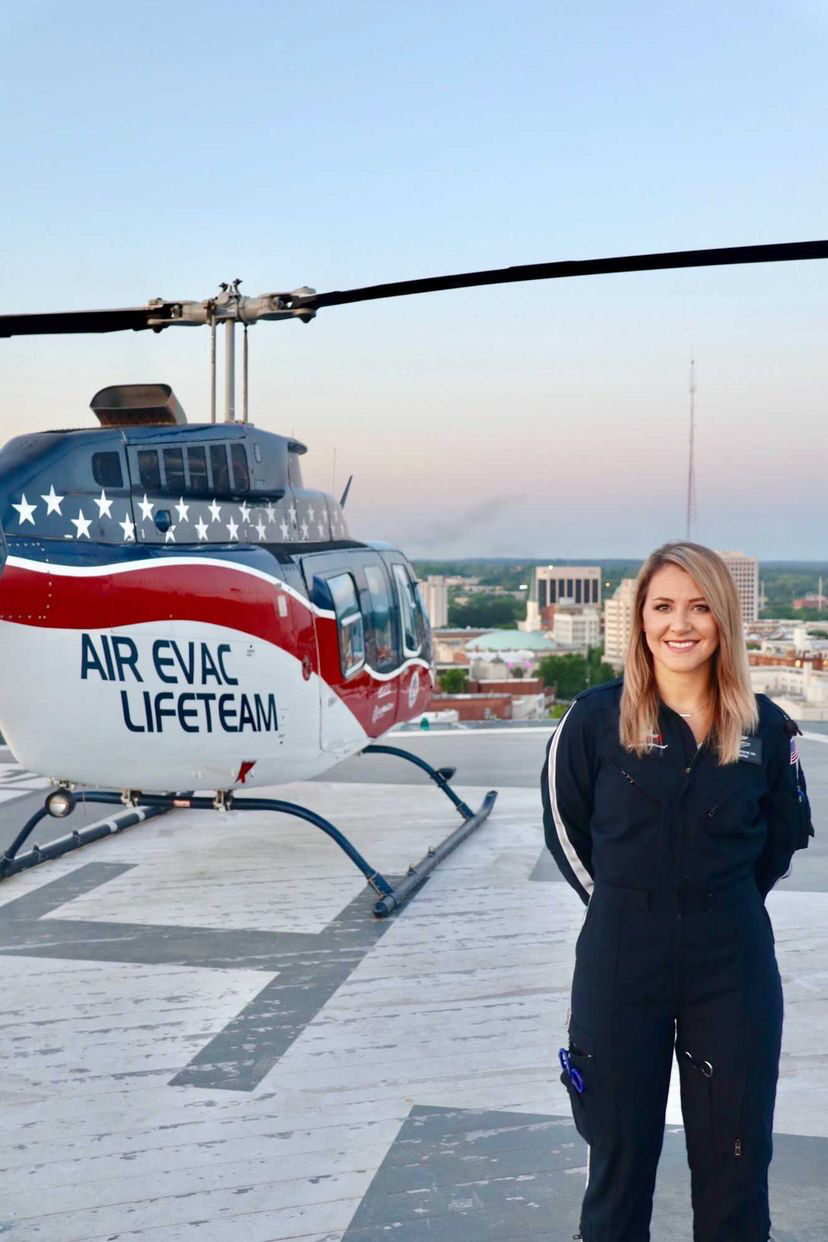She has distinctive memories of her first encounters with the field of nursing as a child, where she would often go to visit her stepmother, an operating room nurse. The exciting environment of the hospital, along with seeing how much her stepmother enjoyed her job, were the factors that ultimately drew Britta Thomason into a career in nursing.
Thomason graduated from the Tanner Health System School of Nursing program in 2011 and worked as an ER and travel nurse for six years prior to transitioning into flight nursing in 2017.
Four years after that decision, Thomason hasn’t looked back. Currently, she serves as program director and part time flight nurse with the Area Evac Lifeteam at the Dublin, Georgia base, one of 13 bases in the state of Georgia.
“It [flight nursing] is great, I love it,” says Thomason. “I wouldn’t go back and do anything different.”
Thomason says that it can be difficult to get into the subspecialty of flight nursing, as there are only 13 bases in the state with four nurses and four medics hired to each base. Together, the medevac team transports critically ill patients to the hospital through helicopter while also providing lifesaving treatment. To be hired as a flight nurse, three years of experience in a level one trauma center or other critical care setting is required. Although the job is physically demanding, Thomason says that it is an immensely rewarding work due to the potential to quickly make an impact for a critically ill person.
“We don’t get called for people that don’t truly need us,” says Thomason. “You have the opportunity to make an impact on someone’s life and that’s awesome.”
Flight nursing has become an increasingly crucial part of critical care medicine, particularly in rural areas that often do not contain trauma one hospitals. The sooner a trauma patient receives care at a trauma one hospital during the ‘golden hour,’ the better their prognosis will be.
“Air Evac Lifetime started in Missouri as a one helicopter company,” says Thomason. “The whole premise behind it was to have a helicopter out in a rural area that was already out there that could quickly get to patients and get them to a hospital.”
The company eventually expanded to include the 13 bases in Georgia, including one air evac base stationed in Carrollton.
Helicopter teams have played a crucial role during COVID-19 in diverting patients to hospitals outside of the state. When Georgia hospitals were over capacity during the initial 2020 wave, as well as during this recent delta virus wave, teams would fly patients to hospitals as far out as Florida, North Carolina, Tennessee and Alabama.
These COVID-19 diversions on top of the usual stroke, heart attack and trauma patient transports have taken a tremendous toll on the healthcare workers.
“This is what is overloading the healthcare system,” says Thomason. “All those other [non-COVID-19] emergencies haven’t stopped, they are still happening and that’s the burden on the EMS and ER systems.”
“I have never seen these emergencies not being taken care of,” continued Thomason, “but everybody is working a lot harder.”
Despite the difficulties of going into nursing during the COVID-19 pandemic, Thomason wants nursing students to know that it is worth it.
“Right now is a tough time to go into nursing, but it is worth it,” she said. “Over the past year and a half since COVID-19 started, who in the world was more important than nurses and paramedics?
“Nursing school is hard,” says Thomason. “You’re going to have a lot of late nights and early mornings, but it will go by so fast and you have so many avenues to take in nursing. The opportunities are endless.”
You may also like
-
UWG’s Ingram Library Hosts Pop-Up Study Spot to Help Students Prepare for Finals Week
-
UWG Offers Mental Health Support And Academic Services To Maintain Student Success During Finals Week
-
UWG Alumnus Shares His Experience Exploring the Underground Flood Channels of Las Vegas
-
Georgia Students Simulate the Struggles of Dementia
-
UWG PR Students Score a Georgia Power Tour at Atlanta Corporate Office
